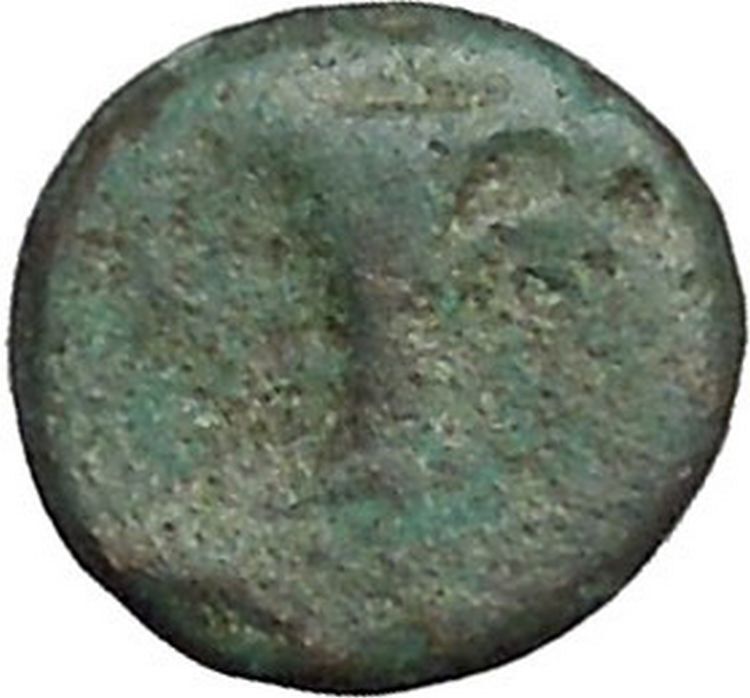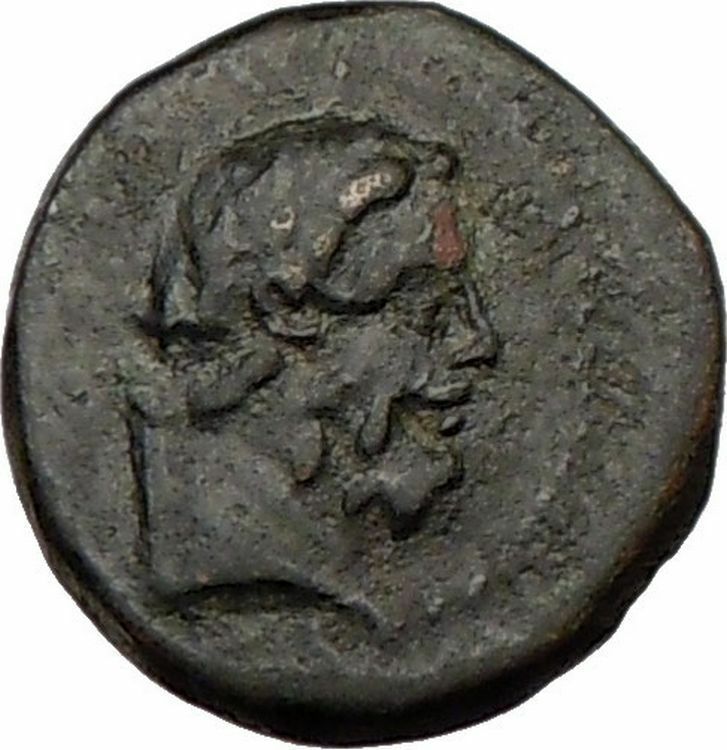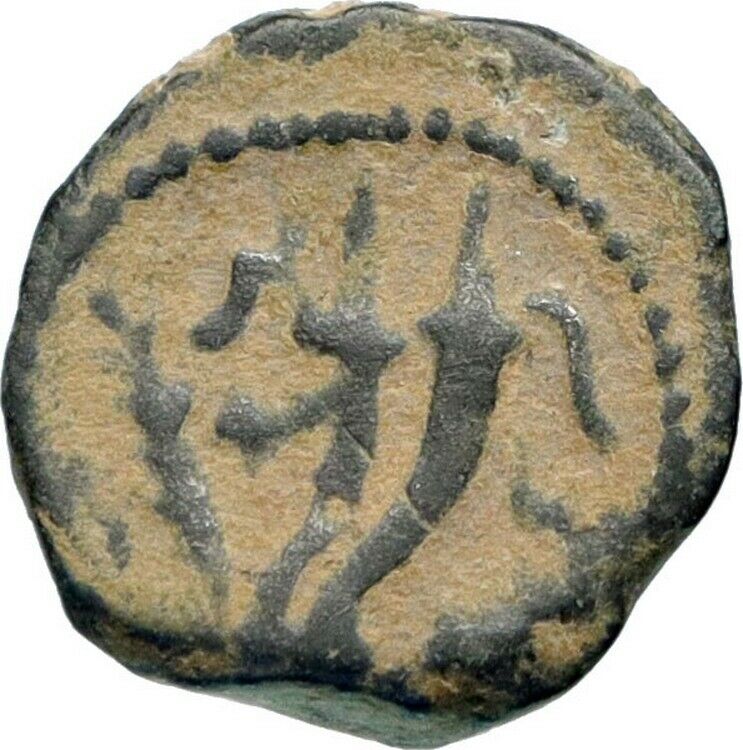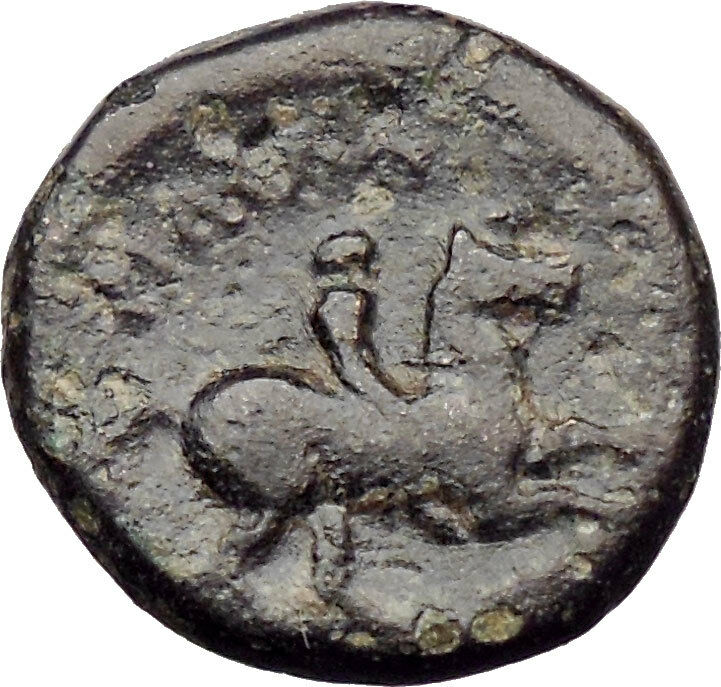|
Alexander III the Great – King of Macedonia 336-323 B.C.
Bronze 17mm (4.71 grams)
Struck under Alexander the Great 336-323 B.C.
Reference: Sear 6739 var.
Head of Hercules right, wearing the lion-skin headdress.
Hercules’ weapons, bow in bow-case and club, ΑΛΕΞΑÎ�ΔΡΟΥ in between.
You are bidding on the exact item pictured,
provided with a Certificate of Authenticity and Lifetime Guarantee of
Authenticity.
HERCULES – This celebrated
of mythological romance was at first called Alcides, but received the name of
Hercules, or Heracles, from the Pythia of Delphos. Feigned by the poets of
antiquity to have been a son of “the Thunderer,” but born of an earthly mother,
he was exposed, through Juno’s implacable hatred to him as the offspring of
Alemena, to a course of perils, which commenced whilst he was yet in his cradle,
and under each of which he seemed to perish, but as constantly proved
victorious.
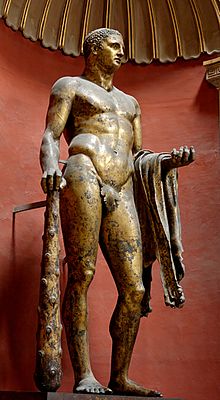
At
length finishing his allotted career with native valor and generosity, though
too frequently the submissive agent of the meanness and injustice of others, he
perished self-devotedly on the funeral pile, which was lighted on Mount Oeta.
Jupiter raised his heroic progeny to the skies; and Hercules was honored by the
pagan world, as the most illustrious of deified mortals. The extraordinary
enterprises cruelly imposed upon, but gloriously achieved, by this famous
demigod, are to be found depicted, not only on Greek coins, but also on the
Roman series both consular and imperial. The first, and one of the most
dangerous, of undertakings, well-known under the name of the twelve labors of
Hercules, was that of killing the huge lion of Nemea; on which account the
intrepid warrior is represented, clothes in the skin of that forest monarch; he
also bears uniformly a massive club, sometimes without any other arms, but at
others with a bow and quiver of arrows. On a denarius of the Antia gens he is
represented walking with trophy and club.
When his head alone is typified, as in Mucia gens, it is covered with the lion’s
spoils, in which distinctive decoration he was imitated by many princes, and
especially by those who claimed descent from him – as for example, the kings of
Macedonia, and the successors of Alexander the Great. Among the Roman emperors
Trajan is the first whose coins exhibit the figure and attributes of Hercules.
The immense issues of coinage made in the name of Alexander
the Great for a topic which could occupy the pages of a large volume. Obviously
it is not possible, in a work of this scope, to do justice to such a subject. As
in the case of Philip II, coinage in the name of Alexander continued long after
the king’s death. No doubt this was largely due to the lack of an effective
successor to the imperial throne. Almost two decades were to elapse before
Alexander’s generals, his true successors, felt sufficiently secure to take the
title of ‘king’ and to issue coinage in their own names. Although he began his
career as King of Macedon, Alexander spent only the first two years of his reign
in his native kingdom, and by the time of his death, at the age of thirty three,
he ruled a vast empire stretching from Greece to India. Consequently, his
coinage was on an imperial scale, unlike those of his predecessors, and was
struck at a multitude of mints in many lands, often replacing an existing
autonomous series. nevertheless, the Macedonian mint of Amphipolis remained one
of the principal sources of currency. In later ages (3rd-2nd century B.C.) the
types of Alexander’s silver coinage were revived by various cities as they
regained a measure of autonomy from the declining Hellenistic Monarchies.
Alexander III of Macedon, popularly known to history as Alexander
the Great,
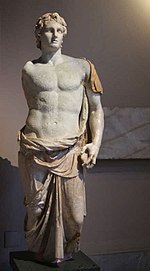
(“Mégas Aléxandros“)
was an
Ancient Greek
king (basileus)
of
Macedon
. Born in 356 BC, Alexander succeeded his father
Philip II of Macedon
to the throne in 336 BC, and died in
Bablyon
in 323 BC at the age of 32.
Alexander was one of the most successful military commanders of all time and
it is presumed that he was undefeated in battle. By the time of his death, he
had conquered the
Achaemenid Persian Empire
, adding it to Macedon’s European territories;
according to some modern writers, this was much of the world then known to the
ancient Greeks (the ‘Ecumene‘).
His father, Philip, had unified most of the
city-states
of mainland Greece under Macedonian
hegemony
in
the
League of Corinth
. As well as inheriting hegemony over the Greeks, Alexander
also inherited the Greeks’ long-running feud with the
Achaemenid Empire
of
Persia
. After reconfirming Macedonian rule by quashing a rebellion of
southern Greek city-states, Alexander launched a short but successful campaign
against Macedon’s northern neighbours. He was then able to turn his attention
towards the east and the Persians. In a
series of campaigns
lasting 10 years, Alexander’s armies repeatedly defeated
the Persians in battle, in the process conquering the entirety of the Empire. He
then, following his desire to reach the ‘ends of the world and the Great Outer
Sea’, invaded India, but was eventually forced to turn back by the near-mutiny
of his troops.
Alexander died after twelve years of constant military campaigning, possibly
a result of malaria
, poisoning
,
typhoid fever
, viral
encephalitis
or the consequences of alcoholism. His legacy and conquests
lived on long after him and ushered in centuries of Greek settlement and
cultural influence over distant areas. This period is known as the
Hellenistic period
, which featured a combination of
Greek
,
Middle
Eastern
and
Indian culture
. Alexander himself featured prominently in the history and
myth of both Greek and non-Greek cultures. His exploits inspired a literary
tradition in which he appeared as a legendary
hero in the
tradition of Achilles
.

Alexander fighting Persian king Darius III. From Alexander
Mosaic, from Pompeii, Naples, Naples National
|








